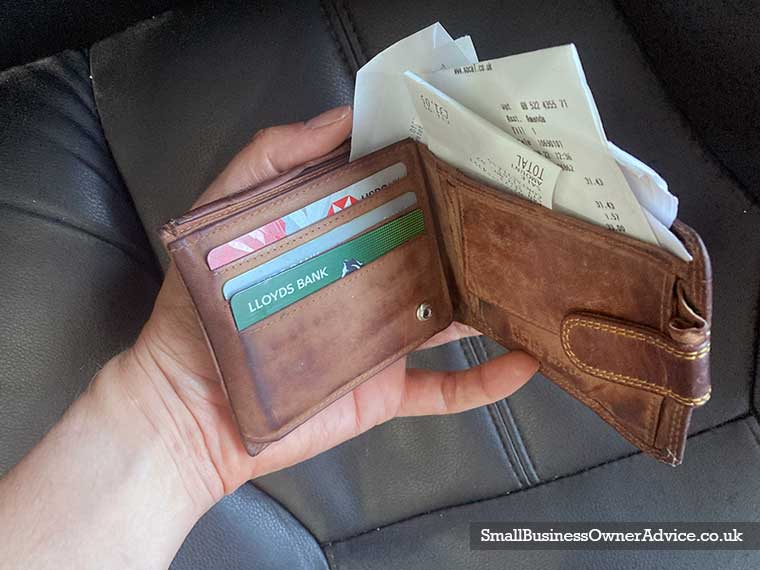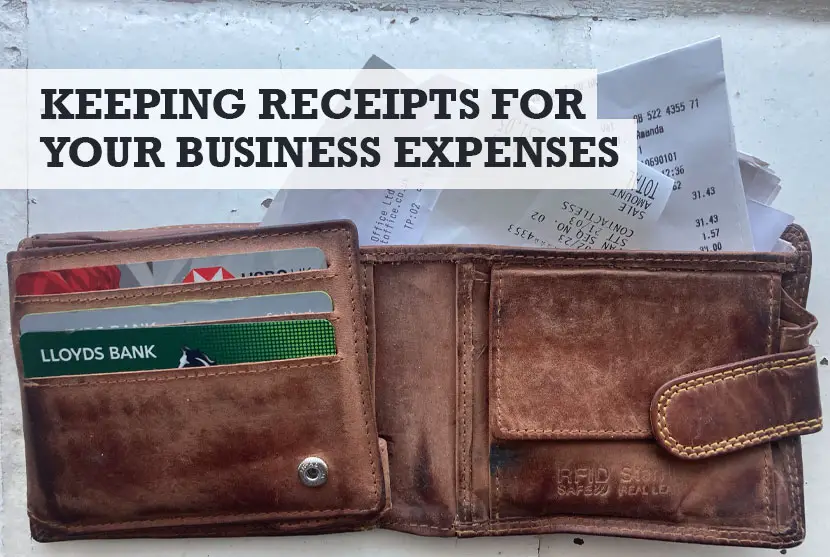If you are running a small business, it’s a legal requirement to keep proper books and records for tax purposes. As a small business owner, what does that mean in practice? For example, do you need to keep receipts for business expenses, and if so, what format should receipts be and how long do you need to keep business expense receipts for in the UK?
Do I need to keep receipts for business expenses in the UK? It is not always necessary to keep receipts for business expenses as a UK business. There is no upper limit to what can be claimed without a receipt, and you can claim VAT up to £25 without a VAT receipt. You must make sure your records are accurate which is difficult without paperwork.
With any business tax-related question, there are always exceptions to the rules. There are several things to consider, all of which we’ve outlined for you below to keep you compliant with HMRC receipt requirements.
Do I need to keep receipts for business expenses?
Yes, and no, but we advise that you do keep all receipts for business expenses, and this will let you maintain proper business records so you can:
- Work out your profit and loss for tax returns.
- Show them to HMRC should you be asked.
You must make sure your records are accurate. You, therefore, need to keep receipts for business expenses if in the UK in order to comply with these requirements.

How long to keep expense receipts?
For a limited company in the UK, you must keep expense receipts and records for 6 years from the end of the last company financial year they relate to, or longer if:
- They show a transaction that covers more than one of the company’s accounting periods.
- The company has bought something that it expects to last more than 6 years, like equipment or machinery.
- You sent your Company Tax Return late.
- HMRC has started a compliance check into your Company Tax Return.
For the self-employed it is slightly easier as you must keep expense receipt records for at least 5 years after the 31 January submission deadline of the relevant tax year. HM Revenue and Customs (HMRC) may check your records to make sure you’re paying the right amount of tax.
Example
If you sent your 2020 to 2021 tax return online by 31 January 2022, you must keep your expense receipt records until at least the end of January 2027.
Can you claim expenses without receipts with the HMRC?
If you cannot replace your records, you must do your best to provide figures. Tell HMRC when you file your tax return if you’re using:
- Estimated figures – your best guess when you cannot provide the actual figures.
- Provisional figures – your temporary estimated figures while you wait for actual figures (you’ll also need to submit actual figures when available).
What about lost receipts for expenses?
Don’t worry if you have lost a receipt, it is not the end of the world. These things happen. In fact, 65% of Senior Decision-makers in finance and accounting admit to losing receipts.
Try to get copies of as many as you can, for example, ask suppliers for duplicate invoices or receipts. Using your business bank account for making purchases will help with this as you will have an audit trail of what was spent and when.
You may have to pay interest and penalties if your figures turn out to be wrong and you have not paid enough tax.
If you are making a claim for expenses from an employer, you may find them less forgiving. It is not uncommon for a business’s travel and expenses policy to state that no reimbursement will be made without a valid receipt.
Handy Hint: Here’s the rules when it comes to applying VAT on train tickets and other travel expenses.
Do bank statements count as receipts for taxes?
A bank statement does not count as a receipt for taxes. It does act as evidence that a payment was made but it does not detail the actual items purchased. To offset purchases against your taxable income you need to be able to prove that the expense was wholly and exclusively for the course of the business.
Payment out of your business bank account will show the date, supplier and the amount that was paid but it does not act as a substitute when it comes to claiming the expense as a business cost.
This is the same when using a credit card or debit card voucher. The information contained on the voucher shows the payment details but not the actual items purchased and cannot, therefore, be used as evidence to claim VAT or business expense.
Example
You make a payment to Amazon for £150 from the business bank account in December. Without a valid VAT invoice, you would not be able to reclaim the VAT and you might also have difficulty convincing HMRC that it was wholly and exclusively for the business.
Frequently asked questions about keeping receipts for business expenses
How much business expenses can I claim without receipts?
In the UK there is no rule on the amount you can claim without a receipt. Sometimes you may make a business purchase without a receipt. To claim these purchases as a business expense, pay for them from your business account, and keep a record of what was purchased, when and why.
Too many expenses claimed without evidence of receipts would be a red flag if HMRC wished to check your records.
If you are VAT registered, you may still claim VAT on business expenses without a receipt if the purchase is below £25. We would always recommend getting a receipt where possible as evidence.
Do I need to keep all receipts for business?
You need to keep proper business records so you can:
- Work out your profit and loss for tax returns.
- Show them to HMRC should you be asked.
In the UK there is no rule on the amount you can claim without a receipt. If you are VAT registered, you may still claim VAT on business expenses without a receipt.
You may have to pay interest and penalties if your figures turn out to be wrong and you have not paid enough tax.
Do I need to keep receipts for expenses?
You must keep a record of all expenses and benefits you provide to your employees.
Your records need to show that you’ve reported accurately, and your end-of-year forms are correct.
HM Revenue and Customs (HMRC) may ask for evidence of how you accounted for each expense or benefit at the end of the tax year.
Example
You reimburse an employee’s travel expenses – you’ll need to keep a record of when and why the employee travelled, and where possible keep receipts as evidence.
Conclusion
Whatever records you keep, it makes sense to organise and keep them in an orderly fashion. This will help you and your accountant (if you have one) as well as HMRC if they need to ask you anything.
If you’re starting a business, help keep it on the right track by keeping good records from the beginning and you’ll find it easier to keep your affairs up to date.
As with anything tax-related in the UK, there are lots of rules and just as many exceptions to the rules. If you want to keep life simple and avoid sleepless nights our advice would be to make sure you get receipts and invoices for business expenses.
Where it is genuinely not possible to do so make sure you pay for it out of a business account, so you have a trail and document details of the purchase to call back on.
Remember, you must keep your records for up to 7 years.
You might also like…

Jon has been in business since 1999, and in that time worked with more than 300 small business clients. As well as being an accountant, he is also an early adopter of tech, and has helped small businesses to leverage the power of their computer systems by creating software to automate and simplify accounting tasks.






